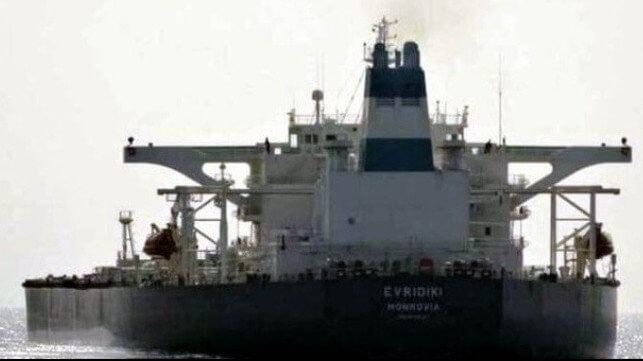Prosecutors Document More Fraud as Tanker is Fined $3M in MARPOL Case

A district court judge in Delaware imposed a $3 million fine and five-year probation on Greek tanker company Liquimar Tanker Management and its vessel the Evridiki during the sentencing hearing on a MARPOL case dating from 2019. The company and the chief engineer were convicted in December 2019 on charges of deliberating concealing pollution, but during the sentencing hearing on Thursday, government prosecutors provided new evidence implicating at least three senior shoreside employees in the efforts to deceive U.S. Coast Guard inspectors.
“Ocean outlaws and polluters such as these will continue to be vigorously prosecuted to the full extent of the law,” said Assistant Attorney General Todd Kim for the Justice Department’s Environment and Natural Resources Division after the sentencing hearing.
The case stems from a March 2019 inspection of the Liberian-flag crude oil tanker Evridiki (167,294 dwt) conducted by the U.S. Coast Guard while the vessel was anchored in Delaware Bay. During the inspection of the tanker that was built in South Korea in 2007, the ship’s Chief Engineer, Nikolaos Vastardis, tried to deceive Coast Guard inspectors regarding the use of the ship’s oily water separator and oil content meter. The jury found Vastardis had used a hidden valve to trap fresh water inside the sample line so that the OCM sensor registered zero parts per million concentration of oil instead of what was really being discharged overboard. When the Coast Guard opened the OWS, they found it was inoperable and fouled with copious amounts of oil and soot.
During the 2019 trial, the Coast Guard showed evidence taken from analyzing historic data recovered from the machine’s memory chip to prove that the meter was being tricked. Vastardis appealed the conviction challenging U.S. jurisdiction over foreign vessels but the conviction was upheld in December 2021.
Government prosecutors provided new evidence on Thursday showing that shoreside staff assisted by creating fake certificates and fake seals sent to the vessel by email on documents attesting to the calibration of the meter and proper testing of pressure relief valves for the cargo. A fake certificate was used during the inspection and the Coast Guard said that Vastardis was specifically asked about the validity of the certificate.
Referring to the forged documents as the “elephant in the room” that the defendants asked the judge to ignore, federal prosecutors told the court that the companies' “failure to address, let alone mention this willful misconduct, demonstrates that these defendants are willfully blind if not completely unrepentant.”

that matters most
Get the latest maritime news delivered to your inbox daily.
They demonstrated to the court that the documents had been faked based on data found on the device. They showed that the meter was not energized on the date that the fake certificate claimed the meter was calibrated. Similarly, the certificate for the testing of the pressure relief valves was dated on a day when the cargo tanks are full. The USCG said it is impossible to test the value when the vessel is loaded with cargo.
The U.S. Department of Justice continues to prosecute MARPOL violations. Over a 20-year period since the 1990s, it was reported that they won convictions against more than 140 shipping firms.
